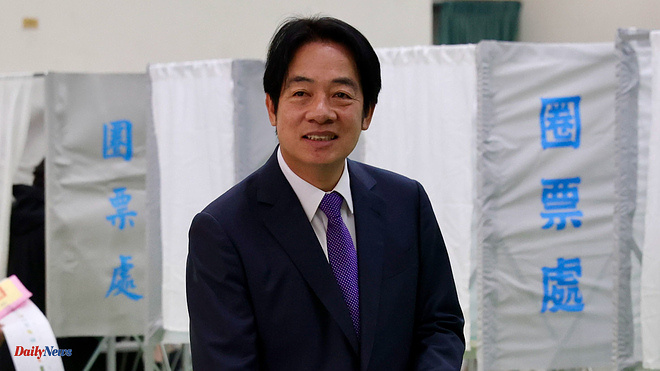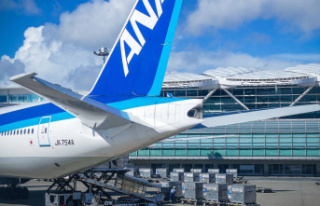The democracy festival in Taiwan has once again demonstrated that, despite the pressures and threats from the powerful communist neighbor, freedoms are fully compatible with having a Mandarin-speaking society.
They promised to be close elections, but there has been no surprise in the outcome: the Progressive Democratic Party (PDP), with an independence-oriented root, scourge of Beijing and friend of the great liberal democracies, has once again won the polls for the third time. consecutive time.
But unlike the previous two legislatures, his victory comes with a new face. Lai Ching-te, a 64-year-old doctor with a long career in Parliament and in high government positions, will be Taiwan's next president.
The current vice president takes over from Tsai Ing-wen with a very continuous program: betting heavily on the rearmament of Taiwan, reducing economic dependence on China and continuing to strengthen ties with the United States, which does not recognize Taiwan as an independent state. but maintains a firm bipartisan commitment to supplying weapons.
Lai, like her predecessor, has used a campaign of fear towards the Asian superpower to revalidate power on the autonomous island that Beijing claims for the PDP with more than five million votes (more than 40% of the total). as part of its territory.
"We have shown the world how much we value our democracy. This is our unwavering commitment," Lai said after his victory in front of more than 400 international journalists accredited to cover the elections. "We are telling the international community that between democracy and authoritarianism, we will be on the side of democracy," she added.
Presenting himself as the only one capable of containing China's authoritarian onslaught is an electoral weapon that works in Taipei. To which we must add the strength of a largely young and loyal electorate that is dazzled by the progressive advances of its Government on equality, environment and LGBT issues.
A couple of hours after the election results came out, the response (softer than expected) came from Beijing in a statement signed by Chen Binhua, spokesperson for the Taiwan Affairs Office, which cited the will of the Xi Jinping's government to "work with political parties, groups and relevant people from various sectors in Taiwan" to promote cooperation.
"Taiwan is China's Taiwan. The elections will not alter the shared aspiration of compatriots on both sides of the Strait to forge greater ties. Our stance on achieving national reunification remains consistent and our determination is as firm as a rock," he said. Chen.
In the midst of all the turmoil that continues to shake the world at the start of 2024, there were many focuses that were focused on a momentous election that, in addition to guiding the relationship between Taipei and Beijing, will mark the pulse between China and the United States during the next years.
"The Taiwanese people have the right to elect their own president," the winner continued. More than 19 million voters among the 23 million inhabitants of the island were summoned to choose by simple majority a new president and 113 legislators for Parliament. Taiwanese had a choice between four more years of the PDP in power or seeking a change in leadership that could ease dangerous tensions with China.
Lai said he is "determined to safeguard Taiwan from China's continued threats and intimidation" and will protect the island's current status quo. "Maintaining peace and stability is an important responsibility, which is why my Government will use dialogue to replace confrontation," he said in a softer and more conciliatory tone than the one he has used during the campaign.
The PDP has obtained almost a million more votes than the Kuomingtang (KMT), a conservative party that maintains a line much closer to Beijing. The victory of Lai, described this week by senior Chinese officials as a "dangerous" politician, undermines any peaceful progress towards the long-awaited "reunification" sought by Xi Jinping's government.
"Through our actions, the Taiwanese people have successfully resisted the efforts of external forces to influence our elections," the new leader stressed.
Most likely, in response to the election results, the Chinese military will increase military pressure with the usual raids of its fighter jets on the median line - the unofficial border - that separates the strait.
Belligerent rhetoric on both sides has triggered global concerns - especially after Russia's attack on Ukraine - that the Chinese military could attack Taiwan.
The always angry position of the Taiwanese Government did not help to calm the waters. That made the election campaign more bitter than usual, with the KMT candidate accusing the PDP of leaving the country on the brink of war with China, while the ruling formation accused the opposition of being pro-Beijing and that His agenda - defending dialogue with China and strengthening ties - endangers Taiwan's sovereignty and security.
On Saturday morning, large crowds of people could be seen queuing to vote at polling stations in Taiwan. In Taipei, in addition to public institutes, some Buddhist temples and churches also became voting centers. In the center of the capital, a couple was getting married in the Zhongshan church, a Gothic style church built by the Japanese in 1937, while in a room next to the chapel dozens of people entered to cast their votes in the ballot boxes.
"Among all the options there are, I have chosen the least bad, that of the PDP, because at least we have the certainty that it will continue to defend Taiwan's independence from China," says a young designer named Pai Dayuan. After the polls close, the "chang piao" begins, the curious counting process in which the results of the polling stations are read aloud and a person takes notes, writing everything down on posters stuck on the blackboards of the polling stations. classrooms.
"My children and grandchildren have voted for the KMT and the Taiwan People's Party -TPP, the third most voted party- because they believe that a change is good for the economy. But I lived through the white terror -as the period of almost 40 years in which the island was under a KMT dictatorship - and the only option I see to ensure our democracy is the one offered by the PDP," defends Mrs. Tai, 74 years old, who has participated in the eight presidential elections completely. free events held on the island.
Although the PDP's Lai was the favorite in all polls, this January's elections were the most uncertain since the island's first direct elections in 1996. And the truth is that the ruling party would never have won if the KMT and the TPP they would have run together in the elections as they tried in December.
But the fight of egos between their leaders to see which of the two was on the list as a candidate for the Presidency, destroyed that opportunity that would have left Lai's party, which was burdened with great disaffection on the part of a part of the population, without options at the polls. its voters, who have seen how life in Taiwan has become more expensive in recent years while their salaries have remained frozen. There are now four months of transition ahead until Lai officially takes office.
The electoral marathon that is taking place this year around the world began with great expectation in a square of great geopolitical relevance as it was in the middle of the new Cold War started by the two great titans of the board.
The fate of the self-governed island has become an international issue and Lai's PDP has vowed endlessly to fight to avoid falling into the clutches of Beijing. The way forward will be to strengthen the alliance with Washington, who, aware of the growing strategic value of the island, uses Taipei as a pawn to anger Beijing whenever it wants.












